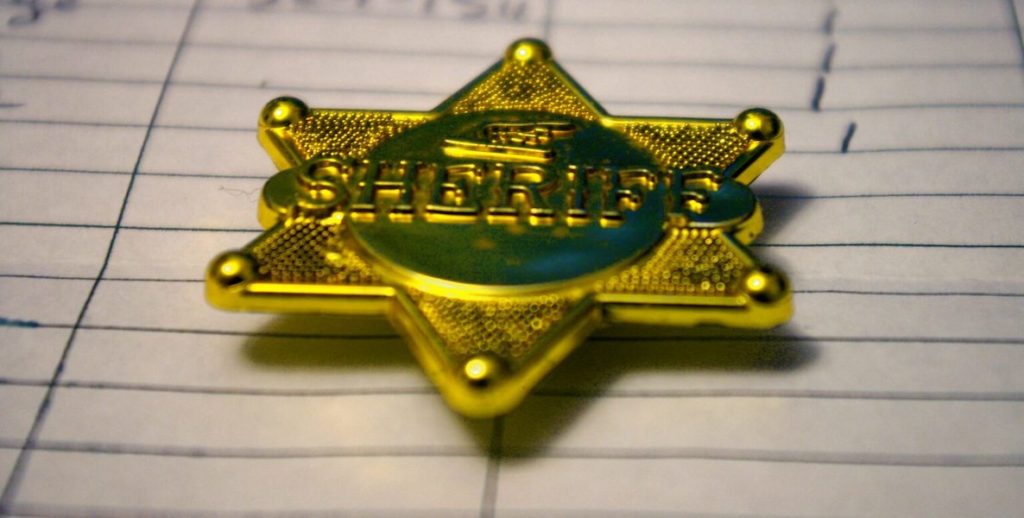If you’ve ever watched an old Western (or even a new one), you prolly know what a sheriff is. He’s the dude with the badge and the big hat. The lawman who fights outlaws. Not exactly a feller you’d find wandering City Hall. In Philadelphia, the sheriff’s job has existed since 1682.
Not surprisingly, the Philadelphia Sheriff’s Office has changed a lot over the centuries — and, more recently, dabbled in corruption. Here, your city’s sheriff’s office, defined.
What is the Philadelphia Sheriff’s Office?
According to the pre-Constitution framework of Philadelphia’s government, the “free-men” of the counties got together each year to elect “a double number of persons to serve for sheriff …” The governor would then select, at his pleasure, one of those two elected persons to be that year’s “high sheriff.” In 17th-century Philadelphia, no sheriff could serve longer than three consecutive years, and couldn’t be elected again for four years afterward.
(Fun fact: This same process was also used to elect coroners. And if the sheriff died during his term, the coroner was automatically promoted to high sheriff. Who better to reach for that flintlock than the county medical examiner, right?)
Today, the Sheriff’s Office is mainly responsible for the physical security of courthouses (buildings, judges, juries, defendants, etc.). The Sheriff also enforces court orders like tax liens and hosts “Sheriff Sales” — public auctions where properties that have been foreclosed are sold off. In recent years, the office has begun handing out free gun locks to help curb gun violence.
Also, those strict term limits, which seemed so important to Philadelphians of 1682 — they’ve been jettisoned. Sheriffs are still elected, but to four-year terms with the possibility of immediate reelection.
A little Philly sheriff history
Our current sheriff, Rochelle Bilal, a former police officer, was elected in 2020. Before her was Jewell Williams, a former state representative, and before him was John Green. This is where the history comes in …
Green served for nearly 23 straight years (1988-2010). That’s long enough to make our Philly forefathers drop their hasty puddings in disbelief. (Green was also the first African American sheriff in Philadelphia history, so that probably wouldn’t have helped their pudding grips either.)
Before being elected sheriff, he was a police sergeant who had served as the president of the Guardian Civic League, an organization of Black police officers.
Green was generally seen as an honest guy with outward compassion for homeowners who were being foreclosed on — which is important, since a substantial part of the sheriff’s duties is overseeing sales of homes after they go into default.
At least, that was the case until 2009, when then-City Controller Alan Butkovitz released a report that showed Green was misappropriating real estate sales and had charged more than $6 million dollars in bogus fees to the City.
In 2010, Green resigned, exiting the state for Florida as charges of corruption began to mount. Three years later, Mayor Michael Nutter’s administration sued him and an accomplice, businessman James Davis, for violating state ethics laws. In 2015, Green was formally indicted by the U.S. Attorney’s Office for conspiracy, bribery and fraud, and was sentenced to five years in federal prison.
His successor, Jewel Williams, was accused by three women of sexual harassment, which resulted in a settlement in 2019.
So how is our current sheriff doing?
Bilal campaigned on a fresh start for the troubled Sheriff’s Office, handily beating Jewell Williams in the 2019 election. She made history by becoming not only the first female, but the first African American female elected to the office.
Bilal took over the office in January 2020, but by March of that same year scandal erupted when she demoted and eventually fired her newly hired Chief Financial Officer Brett Mandel after he pushed back over off-the-books spending.”
At the time, Jon Geeting wrote that, “Bilal does deserve a longer runway to sort out the worst practices from her two predecessors, but the early reaction to this story does not inspire confidence.”
“The better thing to do when Mandel raised these issues would have been to establish a new policy, communicate it to the media and then move on,” he wrote. “The defensive positioning and the firing just makes it seem like Bilal plans to continue these questionable practices.” Geeting called for disbanding the office and dispersing its various responsibilities to the Department of Revenue, the Land Bank and the courts.
“We’ve seen time and time again how the set of cross-pressures within the office seem to turn decent people bad over their tenure, and it’s enough to conclude that it should no longer be an independently elected office.”
MORE FROM THE CITIZEN ON THE PHILADELPHIA SHERIFF’S OFFICE
Additional reporting was contributed by Jon Geeting and Josh Middleton

